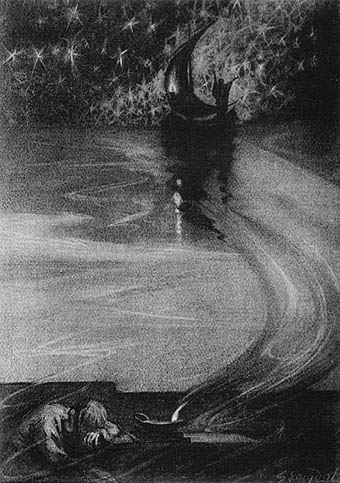Uneven tenor apart, Boston Philharmonic provides a compelling heavenly journey in Elgar’s “Gerontius”
The idea of death haunted Edward Elgar. Even as a young adult he had absorbed the writing of John Henry Newman. The Catholic Cardinal and poet’s “The Dream of Gerontius,” given to the composer as wedding gift, fueled Elgar’s imagination for a work that would capture Newman’s stark visions of death and the afterlife.
A Catholic in Protestant England, Elgar sought to express his religious faith without sacrificing universal appeal. And his The Dream of Gerontius does just that, for Elgar crafted a profoundly personal statement that manages to speak with new vigor in these often profane times.
That’s how Benjamin Zander understands The Dream of Gerontius. The conductor last led Elgar’s lush depiction of the hereafter with the Boston Philharmonic in 2001. In returning to the work with the Philharmonic Friday night at Symphony Hall, Zander delivered a performance that will linger in memory for its iridescence and humanity.
Performances of The Dream of Gerontius remain rare in the United States. That’s a shame, for the work contains some of Elgar’s most stirring music. The composition opens with a prelude that, in Wagnerian fashion, lays bare the main melodic themes. Gerontius is on his deathbed and the music evokes his final thoughts. At one moment his mind wonders into past memories; in others he longs to meet Christ. But above all he is afraid of what death will bring.
In tenor Robert Murray’s depiction of Gerontius Friday night, fear was largely absent. When the character faces the unknown, Murray’s portrayal was two-dimensional, his voice retaining tender warmth more suited to a friendly conversation at a garden party than the agonized thoughts of dying man.
Elsewhere, however, Murray showed more expressive commitment. When Gerontius meets God, Murray lofted a fervent “Take me away, and in the lowest deep there let me be,” a soul’s acceptance of divine judgment.
When Gerontius passes away he is joined by his Guardian Angel, a part that was a fine fit for mezzo-soprano Madeleine Shaw. With a smooth tone that brought a child-like touch to the role, Shaw prepared Gerontius for his union with God and venture into Purgatory. Shaw’s singing spiced Elgar’s vocal writing in a few spots—her light, scooping phrases sweetened the word “agony” with a hint of dissonance.
In his brief roles as the Priest and Angel of the Agony, bass Derek Welton a brought robust voice and the down-home charisma of a country preacher. Belting out the “Proficiscere, anima Christiana” in Part I, Welton’s Priest put Gerontius’s soul to rest with an uneasy peace.
Elgar’s picturesque instrumental writing expresses a vivid tale of spiritual awakening. In the Prelude, the Boston Philharmonic’s strings ground out the dark lyricism; a hymn that emerged in the woodwinds set a reverential scene. In preparation for Gerontius to meet God, the orchestra unwound a long crescendo that erupted in joyous tones. Fanfares from the orchestra’s brass painted a heaven-storming picture without sacrificing tone quality. James David Christie’s organ chords supplied gravity, and Zander’s firm direction, all the while, let the music unfold with natural flow.
In the roles of Gerontius’ bedside attendants as well as choirs of both angels and demons, the singers of Chorus pro Musica, prepared by Jamie Kirsch, sang with diction of spring-water clarity. The choir’s exposed passages in “Praise to the Holiest in the height” wandered out of tune, but when performing as the brood of demons, the singers snarled and barked out phrases of grisly power. The final chorus, which depicts the souls in Purgatory, swelled to the final Amen. For Elgar, death was an entrance into eternity, not an exit from physical reality.
Benjamin Zander will lead the Boston Philharmonic Youth Orchestra in music by Elgar, Ives, Ravel, and Strauss 3 p.m. May 6 at Sanders Theatre. bostonphil.org
Posted in Performances





